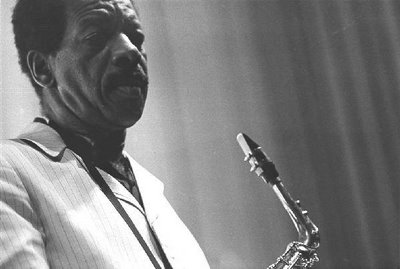
The E Flat Dorian diminished 4 1% narrow Scale.
 With a hat tip to the wonderful be.jazz blog comes this entry in response to this insidious essay by Darius Brubeck. Mwanji Ezana sums up many of my own reactions nicely. Suffice to say that Brubeck lost this debate a long time ago. More than enough has elapsed since 1959 to make that abundantly clear to anyone who uses their ears fearlessly. The comments are well worth checking out.
With a hat tip to the wonderful be.jazz blog comes this entry in response to this insidious essay by Darius Brubeck. Mwanji Ezana sums up many of my own reactions nicely. Suffice to say that Brubeck lost this debate a long time ago. More than enough has elapsed since 1959 to make that abundantly clear to anyone who uses their ears fearlessly. The comments are well worth checking out.What I find intriguing about this story is that it is not "hip-versus-square"’ bebop comedy, but an example of the hip irony, empathy, complicity and pragmatism of the "‘old guard"’ of professional musicians. I also think this story resonates for 21st century jazz educators who, like jazz musicians at the Whitehouse, must take a pragmatic approach to gaining and exploiting prestige -– not selfishly - but on behalf of their programs, their students and institutions and, of course, on behalf of jazz as a legitimate academic discipline worth supporting with funds as well as acclaim. I suspect that playing "avant-garde"’ on the Whitehouse lawn these days would be an audacious act of protest and still not the best tactic for increasing the level of NEA support for jazz.This seems to place "prestige" as an artificial "virtue" that threatens to destroy the very essence of what makes human expression so valuable. At least the White House lawn circa 1979 was under an administration that valued Dizzy Gillespe and Cecil Taylor. The notion of "playing by the rules" to appease the sensibilities of the present administration - one that is disinterested in extending NEA support at best - is not something that serves artistic growth and progress. The nuances of improvised music would be completely lost - if not wasted - on those who find the Geneva Conventions "quaint" and defend the practice of torture.
What do we hear then, if not "‘harmolodics"’, that makes him so identifiable? First of all, his controversial pitch - and we'’re used to that now. Since 1960 we'’ve also heard plenty of music from other cultures using various tuning systems. Non-standard tuning is also a signifying sound used by jazz musicians laying claim to a non-western identity.Here the fact that Darius Brubeck doesn't get Ornette Coleman as a point of personal prejudice and complete misunderstanding is exposed with blinding clarity. Music does not divide into "western" and "non-western" musics. To do so places "western" music - and its accompanying harmonic/intonation/rhythmic practices - as the standard against which all other musics are understood. Ornette Coleman understands that music is music. It is not a game of "prestige" used for flaunting how well one has internalized the established rule structures (and such flaunting can and does take the form of deliberately "breaking the rules" vis a vis serialism/atonal practices). Rather than hearing "non-standard tunings" as some kind of game where the object is to "lay claim to a non-western identity" Brubeck should open his ears and hear "non-standard tunings" as harmony.
